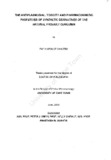| dc.contributor.author | Okalebo, FA | |
| dc.date.accessioned | 2015-06-20T07:36:26Z | |
| dc.date.available | 2015-06-20T07:36:26Z | |
| dc.date.issued | 2008 | |
| dc.identifier.citation | Doctor of Philosophy in Clinical Pharmacology | en_US |
| dc.identifier.uri | https://open.uct.ac.za/handle/11427/3294?show=full | |
| dc.identifier.uri | http://hdl.handle.net/11295/85268 | |
| dc.description.abstract | Malaria is the most devastating protozoal infection in humans. There is
widespread resistance to existing antimalarial agents hence the need for new
antimalarial drugs. Curcumin, a natural product isolated from Curcuma
/ongaldomestica, was used as a scaffold for the synthesis of new compounds
with antiplasmodial activity. Curcumin was selected because of its low toxicity
and is commercially available at a low cost.. Derivatives of curcumin were
designed to act against selected molecular targets in Plasmodium falciparum.
It was hoped that the derivatives would have a better oral bioavailability and
antiplasmodial activity than the parent compound. The derivatives were tested
for in vitro antiplasmodial activity against the chloroquine sensitive (D10) and
chloroquine resistant (K1) strains. In addition they were evaluated for their in
vitro ability to inhibit the formation of beta- hematin which is the chemical
equivalent of hemozoin which is responsible for the pathophysiological
responses observed in malaria. | en_US |
| dc.language.iso | en | en_US |
| dc.publisher | University of Cape Town | en_US |
| dc.title | The antiplasmodial, toxicity and pharmacokinetic properties of synthetic derivatives of the natural product Curcumin | en_US |
| dc.type | Thesis | en_US |
| dc.description.department | a
Department of Psychiatry, University of Nairobi, ; bDepartment of Mental Health, School of Medicine,
Moi University, Eldoret, Kenya | |
| dc.type.material | en_US | en_US |

